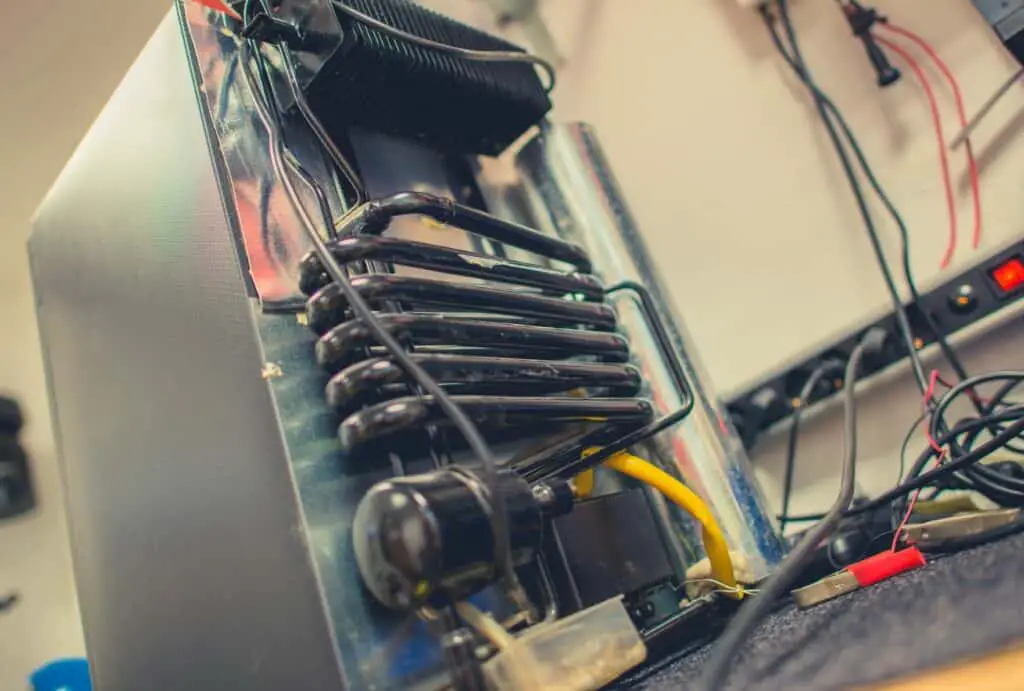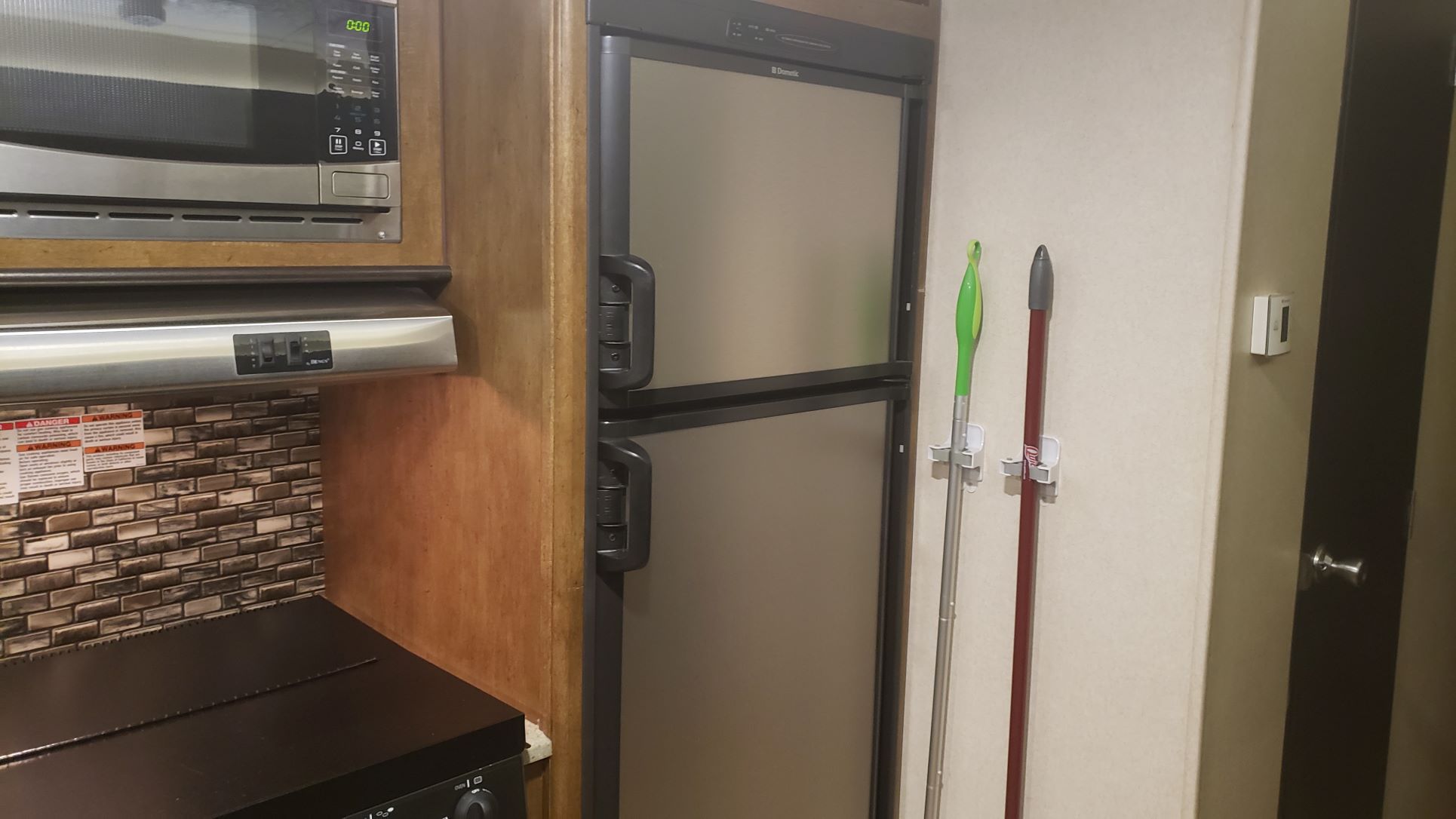Recreational vehicles, or RVs, offer the comforts of home while traveling, and a vital component of that comfort is the RV refrigerator. This appliance keeps food and beverages cold and fresh throughout the journey, making it an essential part of any motorhome or camper. However, unlike traditional household refrigerators that rely on compressors and freon, RV refrigerators operate using a unique mechanism designed for mobile environments.
RV refrigerators, technically known as “absorption refrigerators,” use a combination of gases and chemical reactions to evaporate and condense air inside the unit. They can run on various power sources, such as 12V power from the vehicle’s alternator, 120V power plugged into a campground shore power pedestal, or liquid propane gas (LP). This versatility and unique cooling process make RV refrigerators suitable for life on the road, ensuring that travelers can rely on these vital appliances to store and preserve their food, no matter where their adventures take them.
Concept of RV Refrigerator
Compressor vs. Absorption Refrigerators
RV refrigerators mainly come in two types: compressor-based and absorption-based refrigerators. Compressor refrigerators are widely known and used in residential homes. They work by circulating refrigerant gas, compressing it, and then releasing it through a condenser, which cools down and turns into a cold vapor. This vapor absorbs heat from the refrigerator’s interior, helping maintain a consistent temperature.
On the other hand, absorption refrigerators function using a completely different mechanism and are commonly found in motorhomes. These refrigerators rely on a chemical reaction and heat to provide cooling. Absorption RV refrigerators can typically operate using electricity or propane gas, making them versatile and ideal for traveling.
Understanding the Absorption Process
The absorption process in RV refrigerators involves a series of chemical reactions between ammonia, hydrogen gas, and water. First, a heat source, such as a propane burner or an electric heating element, is used to heat an ammonia and water solution, causing it to evaporate. The ammonia vapor then moves through a condenser, cooling down and returning to a liquid state. At this point, the liquid ammonia enters an evaporator and combines with hydrogen gas, resulting in an endothermic reaction that absorbs heat from the refrigerator’s interior.
The now-cooled ammonia and hydrogen gas mixture moves into an absorber chamber, where the ammonia combines with water, separating from the hydrogen gas. This allows the hydrogen gas to return to the evaporator and repeat the cycle while the ammonia-water solution returns to the initial heating phase.
In summary, the absorption cooling process in RV refrigerators relies on chemical reactions between ammonia, hydrogen, and water, all driven by a heat source. This unique mechanism allows for flexibility in power sources and efficient temperature regulation, making absorption refrigerators suitable for motorhomes and other recreational vehicles.
Working of an RV Refrigerator
Power Sources
RV refrigerators operate on different power sources, including propane, battery, generator, solar panels, and electricity via AC or DC power. The most common are 2-way fridges that use either LP gas and 12V DC power and 3-way fridges that can run on propane, 12V DC power, and 120V AC shore power from an electrical power source. Choosing the right power source for your RV refrigerator depends on your motorhome’s setup and energy requirements.
Operation Mechanism
The primary component of most RV refrigerators is an absorption refrigerator system. Unlike a household fridge with a compressor, an absorption refrigerator relies on chemical reactions and heat to maintain cold temperatures. This system includes an ammonia-water liquid solution, hydrogen gas, and coils to aid evaporation and condensation processes.
In the absorption fridge, a heating element fueled by propane, electricity, or solar power heats the ammonia-water solution, causing it to evaporate. The evaporator absorbs heat from the refrigerator’s interior, reducing the temperature inside. The cooling effect is maintained by circulating the cooled air through the freezer and refrigerator compartments.
As the ammonia vapor moves through the coils, it condenses into a liquid form, releasing the absorbed heat to the environment via a vent. The liquid ammonia is then guided back into the absorber, which combines with water again, starting the cycle anew.
To ensure optimal efficiency, the RV refrigerator’s ventilation system must properly function to dissipate heat to ambient temperatures. Fans can be added to help with air circulation and prevent overheating of the vent and coils.
The latching system in RV refrigerators keeps the doors securely shut during travel, maintaining a consistent temperature inside. The system allows the fridge and freezer to cool down evenly and maintain the desired temperature while parked or moving.
In summary, the working of an RV refrigerator involves an absorption mechanism to maintain a cool temperature, various power sources to supply energy, and essential components like vents, fans, and latching systems to ensure optimal functionality in a motorhome setting.
Types of RV Refrigerators
RV refrigerators are essential for maintaining a comfortable lifestyle while traveling in a motorhome. Several types and manufacturers are available, with the most popular brands being Dometic and Norcold. This section will compare and discuss the differences between these manufacturers and focus on two common types of RV refrigerators: 3-way and 2-way refrigerators.
Dometic Vs. Norcold
Both Dometic and Norcold are well-known manufacturers of RV refrigerators. While they offer reliable and efficient cooling solutions, their products differ slightly in design, features, and performance.
Dometic offers a wide range of RV refrigerators with varying sizes and capacities. Known for their innovation, Dometic’s line of refrigerators often includes advanced safety features and an easy-to-use control panel. Their products utilize various cooling processes, ensuring energy efficiency and versatility.
Norcold, on the other hand, has been a leader in RV refrigeration for over 50 years. Their refrigerators boast a reputation for reliability, durability, and performance. Like Dometic, Norcold offers various cooling mechanisms and designs to cater to RV owners’ different needs and preferences.
Although both Dometic and Norcold provide quality RV refrigerators, choosing the right one for your motorhome depends on available space, desired features, and personal preference.
3-way Vs. 2-way Refrigerators
RV refrigerators commonly come in either 3-way or 2-way variations. Understanding the differences between these two options can help you make an informed decision when selecting the best refrigerator for your motorhome.
3-way Refrigerators: Also known as tri-power fridges, these refrigerators can operate on three different power sources: electric power (shore power or generator), 12V DC power (from your RV’s batteries), and propane gas. The flexibility in power options makes these refrigerators popular among RV owners who frequently move between various locations without a constant power source. However, they are more expensive and consume more energy than 2-way refrigerators.
2-way Refrigerators: Also known as dual-power fridges, these refrigerators run on only two power sources: electric power (shore power or generator) and propane gas. They are typically more energy efficient and cost less upfront than 3-way refrigerators. While less versatile in power options, they still allow users to switch between electric and propane power sources, depending on their needs.
The cooling process in both refrigerators relies on chemical reactions rather than the traditional compressor found in household fridges. This mechanism, called absorption cooling, allows RV refrigerators to operate more quietly and efficiently.
In conclusion, whether you choose a Dometic or Norcold refrigerator and a 3-way or 2-way refrigerator, your decision should be based on your needs, budget, and preferences.
Maintenance and Repair

RV Refrigerator Lifespan and Care
An RV refrigerator is an essential appliance for any motorhome traveler. To ensure its longevity, routine maintenance is key. Some essential maintenance tips include keeping the refrigerator clean by wiping down the stainless steel surfaces, checking the door seals for damage or wear, and regularly monitoring the internal temperature with a thermometer. Proper ventilation is also crucial to maintaining optimal performance and should never be obstructed, as it ensures the even distribution of cold air throughout the fridge.
Another critical factor in RV refrigerator lifespan is proper leveling. A balanced motorhome allows your refrigerator to operate more efficiently by maintaining an even distribution of heat and moisture within the unit. It’s essential to level your RV when parked, especially for extended periods, to prevent damage to the cooling system.
Dealing with Common Issues
Several common issues can arise with an RV refrigerator, but addressing them promptly and effectively can help avoid costly repairs. One such issue is the fridge’s buildup of excess moisture or frost. In this case, a thorough defrosting may be needed. Ensure to remove all items from the refrigerator, turn them off, and keep the doors open to let the ice naturally melt. Besides, you can use a windmill dehumidifier to keep moisture in check and maintain your refrigerator’s efficiency.
Another frequent problem is the refrigerator not maintaining its proper temperature. If this occurs, you may need to inspect the cooling unit, seals, or ventilation for issues. Ensure the vents are free of debris and obstructions to allow proper airflow.
Sometimes, your RV refrigerator may require professional repair – for instance, when a noticeable ammonia smell indicates a possible evaporator leak. In such cases, it is crucial to immediately turn off the refrigerator and seek the assistance of an RV refrigerator specialist’s assistance.
By adhering to these maintenance and repair tips, you can keep your RV refrigerator in optimal working condition, prolong its lifespan, and ensure your perishables stay fresh throughout your motorhome adventures.
Boondocking and Portable Solutions
Saving Battery and Propane While Boondocking
Boondocking, or camping off-grid, can pose challenges when powering your RV refrigerator. Since most RV refrigerators operate on propane or electricity, conserving battery power and propane is crucial when you’re away from a reliable power source. One option to save energy is by integrating solar panels into your rig. Portable solar panels can recharge your RV’s battery bank, providing a consistent energy source for your refrigerator and other appliances.
Another energy-saving strategy is to install an RV refrigerator fan. This device enhances the efficiency of your fridge by circulating cool air more evenly, ultimately reducing the energy needed to maintain the desired temperature. Moreover, keeping the refrigerator at optimum working conditions, such as door seal maintenance, proper ventilation, and avoiding overloading, contributes to saving energy, too.
Portable and Mini Fridges
A portable or mini-fridge can be an excellent alternative to a traditional RV refrigerator, particularly for a smaller motorhome or when boondocking. They often work on 12-volt power, which makes them more energy-efficient and suitable for off-grid camping. Moreover, portable fridges are highly compatible with solar power, as they can be connected directly to portable solar panels.
While residential fridges and household refrigerators are also an option, they typically require an inverter to function, which can be a more complex and energy-consuming solution. Nevertheless, investing in a larger battery bank and a high-quality inverter can make it achievable if you need to run a residential refrigerator while boondocking. Sometimes, a silent generator can provide the required power for short trips or one-off situations.
In conclusion, when boondocking, being mindful of energy consumption and exploring portable solutions can help you maintain the quality and efficiency of your RV refrigeration system.
Frequently Asked Questions
How do absorption refrigerators function?
Absorption refrigerators, commonly found in RVs, utilize a process that involves evaporating and condensing the air inside through gases and chemical reactions. These refrigerators use ammonia, hydrogen gas, and water to facilitate this process. Source.
What is the role of propane in RV fridges?
Propane plays a significant role in RV absorption refrigerators, as it is the primary fuel used to generate the heat required for the cooling process. This heat allows ammonia to boil and initiate the sequence of chemical reactions critical for the proper functioning of the fridge. Source.
How do 12v RV refrigerators operate?
12v RV refrigerators, or compressor refrigerators, operate similarly to residential fridges. They use an electric compressor to compress refrigerant gas, condensing and releasing heat. The refrigerant then evaporates at low pressure, absorbing heat from the fridge’s interior and maintaining the desired temperature. Source.
Do RV fridges need to be level to work properly?
Yes, RV fridges need to be level to function efficiently. This is particularly important for absorption refrigerators, as being level ensures that the chemicals inside can flow smoothly throughout the system, maintaining the cooling process. If an RV fridge is not level, the performance can decline, possibly leading to damage within the system. Source.
What are the differences between gas and electric RV fridges?
Gas RV fridges rely on propane to generate the heat necessary for their cooling process, while electric RV fridges use an electrical source like a 12v battery. Absorption refrigerators are commonly used in gas-powered systems, whereas compressor refrigerators are typically used in electric systems. Both types have advantages and drawbacks regarding efficiency, cost, and accessibility to different power sources. Source.
How can an RV fridge maintain its temperature?
An RV fridge maintains its temperature through a combination of insulation, the vaporization of refrigerants, and heat exchange mechanisms. In absorption refrigerators, the chemical reactions between ammonia, hydrogen gas, and water help maintain a steady temperature. In contrast, compressor refrigerators rely on the functions of a condenser, evaporator, and compressor to regulate the temperature. Source.
Don’t forget to check out our Recommended RV Equipment list!
Get a FREE copy of the Go Together Go Far Travel Trailer Hookup and Disconnect Checklist when you sign up for the Go Together Go Far Newsletter!
Want to learn more about different types of RVs? Check out:
- Best Off-Road Camper Trailer Under $10,000
- Best Bunkhouse Travel Trailer Under 30 Feet
- Are Lance Travel Trailers Any Good?
- Do Rope Lights Deter Rodents?
- What Are the Best Names in the RV Industry?
- 3 Best Travel Trailers for Family of Four
- Blue Ox SwayPro Basics: Top Questions Answered
- Adding A Washer Dryer To Travel Trailer? What You Need To Know.
- Best Drone For Camping, Backpacking, and RVing: A Complete Guide to Drones for RVers
- Furniture and RVs – How To Get It Through the Door…
- How To Get Rid Of A Poop Pyramid In RV Black Tank
- Do You Know How Long To Keep Fresh Water In RV Tank Storage?
- What Is The Best Outdoor Security Camera System For Your RV?
- RV Bumper Mount Grills: 5 Best Options For Your RV Or Camper
- Best Electric Tankless Water Heater for Your RV. What You Need To Know
- Read Before You Buy! How to Find the Best Scooter for RV Camping
- 3 Best Travel Trailers for Family of Four
- Top RV Brands: What Are the Best Names in the RV Industry?
- Lance Campers: What Makes Them So Different?
- Best Bunkhouse Travel Trailer Under 30 Feet
- Best Off-Road Camper Trailer Under $10,000
- Best Weight Distribution Hitch With Sway Control For Travel Trailers in 2022
- What Are The Best Built Travel Trailers? Things To Consider.
- How Does An RV Refrigerator Work? A Quick Guide.
- Why Does My RV Carbon Monoxide Detector Keep Beeping? A Quick Guide.
- Where Is The Power Converter In My RV Or Travel Trailer
- What is the Best Generator for 50 Amp RV?
- Wireless RV Security Camera Systems: Is Solar Powered Security Without Wi-Fi An Option?
- Best Portable Air Conditioner for Camping for 2022
- How to Find the Best 3500 Watt Inverter Generator for RV Camping
- Best Propane Generator For Your RV: Read This Before You Buy!


